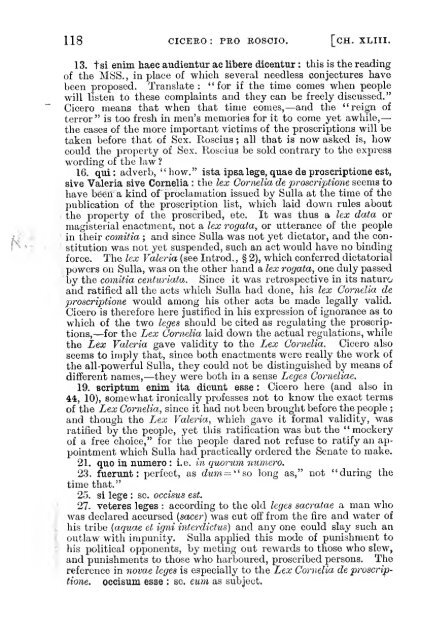Pro S. Roscio Amerino
Pro S. Roscio Amerino
Pro S. Roscio Amerino
You also want an ePaper? Increase the reach of your titles
YUMPU automatically turns print PDFs into web optimized ePapers that Google loves.
118 CICERO : PRO ROSCIO, [CH. XLIII.<br />
13. tsi enim haec audientur ac libere dicentur : tliis is the reading<br />
of the MSS., in place of which several needless conjectures have<br />
been proposed. Translate " : for if the time comes when people<br />
will listen to these complaints and they can be freely discussed."<br />
Cicero means that when that time comes,—and the "reign of<br />
terror " is too fresh in men's memories for it to come yet awhile,<br />
the cases of the more important victims of the proscriptions will be<br />
taken before that of Sex. Roscius ; all that is now asked is, how<br />
could the property of Sex. Roscius be sold contrary to thc express<br />
wording of the hxw ?<br />
t 16. qui: adverb, "how." ista ipsa lege, quae de proscriptione est,<br />
'; sive Valeria sive Cornelia : the lex Gcyrmlia de proscriptione seems to<br />
\ have beeii' a kind orproclamation issued by SuUa at the tirae of the<br />
Ipublication of the proscription list, which laid down rules about<br />
i the property of the proscribed, etc. It was thus a lex data or<br />
l magisterial enactment, not a lex rogaia, or utterance of the people<br />
in their comitia [ ; and since SuUa was not yet dictator, and the con-<br />
I stitution was not yet suspended, such an act would have no binding<br />
» force. The lex Valeria (see Introd., § 2), which conferred dictatorial<br />
fpowers on Sulla, was on the other hand a lex rogata, one duly passed<br />
)\>y the comitia centuriata. Since it was retrospective in its naturo<br />
land ratified all the acts which SuIIa had done, his lex Cornelia de<br />
\proscriptione would among his other acts be made legally valid.<br />
ICicero is therefore here justified in his expression of ignorance as to<br />
; which of the two leges should be cited as regulating the proscrip-<br />
:tions,—for the Lex Gornelia laid down the actual regulations, while<br />
'the Lex Valeria gave validity to the Lex Gonielia. Cicero also<br />
seems to imply that, since both enactments were really the work of<br />
the all-powerful Sulla, they could not be distinguished by means of<br />
'different names,—they were both in a sense Leges Corneliae.<br />
19. scriptum enim ita dicunt esse : Cicero here (and also in<br />
44, 10), somewhat ironically professes not to know the exact terms<br />
of the Lex Cornelia, since it had not been brought before the people ;<br />
and though the Lex Valeria, which gave it formal validity, was<br />
ratified by the people, yet this ratification was but the " mockery<br />
of a free choice," for the people dared not refuse to ratify an appointment<br />
which Sulla had practically ordered the Senate to make.<br />
21. quo in numero : i.e. in quorum numero.<br />
2.3. fuerunt : perfeet, as du7n="so long as," not "during the<br />
time that."<br />
25. si lege : sc. occisus est.<br />
27. veteres leges : according to the old leges sacratae a man wlio<br />
was declared accursed {sacer) was cut off from the fire and water of<br />
his tribe (aquae et igni interdictus) and any one could slay such an<br />
outlaw with impunity. SuIIa applied this mode of punishment to<br />
his political opponents, by meting out rewards to those who slew,<br />
: and<br />
punishments to those who harboured, proscribed persons. The<br />
? reference in novae leges is especially to the Lex Cornelia de proscriptione.<br />
occisum esse : sc. eum as subject.<br />
—

















